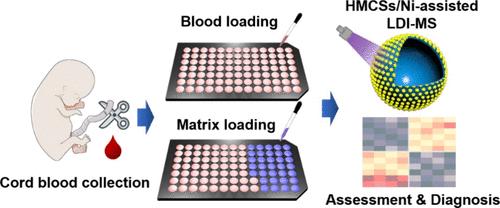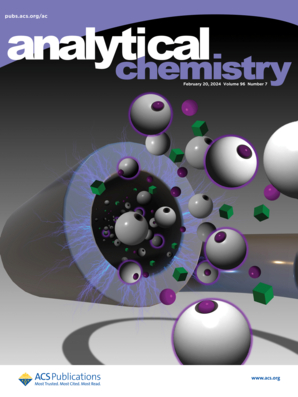中空介孔碳纳米球/Ni杂化物有助于母亲和胎儿COVID-19恢复评估的代谢编码
IF 6.7
1区 化学
Q1 CHEMISTRY, ANALYTICAL
引用次数: 0
摘要
体液代谢物分析是一种先进的疾病诊断和状态评估方法。激光解吸/电离-质谱法(LDI-MS)因其检测速度快、样品预处理简单等优点被广泛应用于代谢分析。本文设计并合成了以Ni为锚定的中空介孔碳纳米球(HMCSs/Ni),利用其中空介孔结构、大表面积和丰富的Ni - n键,同时增强了LDI工艺的电离和热脱附过程。基于HMCSs/Ni,构建了可用于代谢信息提取的LDI-MS平台,实现了痕量血清样品(~ 0.1 μL)中代谢指纹的快速检测(约秒/个样品),无需复杂的预处理程序。然后,我们对一组新冠肺炎康复孕妇进行血清代谢筛查。优化后的机器学习模型能够根据代谢特征区分康复孕妇和未感染孕妇,AUC值为0.901。此外,该模型表明,母体感染COVID-19对胎儿的代谢指纹没有显著影响。总之,我们的工作显示了HMCSs/ ni辅助LDI-MS在疾病恢复评估和代谢物分析方面的前景。本文章由计算机程序翻译,如有差异,请以英文原文为准。

Hollow Mesoporous Carbon Nanospheres/Ni Hybrids Aid in Metabolic Encoding for COVID-19 Recovery Assessment in Mothers and Fetuses
Metabolite analysis of body fluids is an advanced method for disease diagnosis and status assessment. Laser desorption/ionization-mass spectrometry (LDI-MS) has been widely employed for metabolic analysis due to the fast detection speed and simple sample pretreatment. Here, we designed and synthesized hollow mesoporous carbon nanospheres anchored with Ni (HMCSs/Ni) to simultaneously enhance the ionization and thermal desorption processes of the LDI process owing to their hollow and mesoporous structure, large surface area, and abundant Ni–N bonds. Based on HMCSs/Ni, we built an LDI-MS platform that can be used for metabolic information extraction and achieved the rapid detection (about seconds per sample) of metabolic fingerprints in trace serum samples (∼0.1 μL) without complicated preprocessing procedures. Then, we conducted serum metabolic screening in a cohort of COVID-19-recovered pregnant women. The optimized machine learning model could distinguish recovered pregnant women from uninfected pregnant women based on metabolic features with an AUC value of 0.901. In addition, the model indicates that maternal COVID-19 infection does not significantly affect the metabolic fingerprints of the fetuses. Overall, our work shows the prospect of HMCSs/Ni-assisted LDI-MS in disease recovery assessment and metabolite analysis.
求助全文
通过发布文献求助,成功后即可免费获取论文全文。
去求助
来源期刊

Analytical Chemistry
化学-分析化学
CiteScore
12.10
自引率
12.20%
发文量
1949
审稿时长
1.4 months
期刊介绍:
Analytical Chemistry, a peer-reviewed research journal, focuses on disseminating new and original knowledge across all branches of analytical chemistry. Fundamental articles may explore general principles of chemical measurement science and need not directly address existing or potential analytical methodology. They can be entirely theoretical or report experimental results. Contributions may cover various phases of analytical operations, including sampling, bioanalysis, electrochemistry, mass spectrometry, microscale and nanoscale systems, environmental analysis, separations, spectroscopy, chemical reactions and selectivity, instrumentation, imaging, surface analysis, and data processing. Papers discussing known analytical methods should present a significant, original application of the method, a notable improvement, or results on an important analyte.
 求助内容:
求助内容: 应助结果提醒方式:
应助结果提醒方式:


